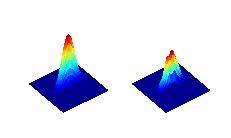DFG - Adaptive Wavelet Methods for Inverse Problems
| Working Group: | WG Industrial Mathematics |
| Leadership: | Prof. Dr. Dr. h.c. Peter Maaß ((0421) 218-63801, E-Mail: pmaass@math.uni-bremen.de ) |
| Processor: | Dr. Thomas Bonesky |
| Funding: | Deutsche Forschungsgemeinschaft (DFG) |
| Project partner: |
Prof. Dr. Stephan Dahlke, Philipps-Universität Marburg; AG Numerik / Wavelet-Analysis Dr. Thorsten Raasch, Philipps-Universität Marburg; AG Numerik / Wavelet-Analysis |
| Time period: | 16.10.2006 - 15.10.2009 |

Many scientific and technical processes can be modeled as inverse problems. These processes have one thing in common. The variable of interest can not be measured directly, but has to be reconstructed with the help of measurements connected with the variable of interest in a specific way. This connection can often be modeled via linear or nonlinear operator equations. Solving such operator equations always requires an efficient solver for the forward problem, as well as some suitable regularization scheme.
The AG Numerik / Wavelet-Analysis located at the Philipps-Universität Marburg is specialized on the construction of adaptive wavelet methods for solving partial differential equations. A main area of research of the AG Technomathematik are regularization methods for inverse problems. In particular regularization methods incorporating so called "sparsity constraints", which means that the unknown solution of the operator equation is assumed to have a sparse representation in some basis, have been evolved into a research field of growing importance .
The cooperation project "Adaptive Wavelet Methods for Inverse Problems" combines both techniques. As an application an inverse heat conduction problem was chosen. It aims at reconstructing the temperature distribution inside a steel furnace incorporating only measurements outside the furnace.

